目录
- 1. 前言
- 2. webvirtmgr 简介
- 3. webvirtmgr 部署实践
- 3.1 配置 webvirtmgr 主机
- 3.2 kvm node节点配置
- 3.3 控制台和kvm节点交互配置
1. 前言
上一篇:[kvm] Ovirt基础及安装使用 介绍了 ovirt 的安装和基础使用,本篇则介绍更加轻量级的 webvirtmgr,相比较 ovirt,webvirtmgr则显得更加轻量化和简单易用。
ovirt 比较适合较大的集群规模,比如虚拟机上千的集群,而对于虚拟机10-200 之间来说,采用 webvirtmgr 将更加便捷。
2. webvirtmgr 简介
webvirtmgr 特点
操作简单,易于使用
通过libvirt的API接口对kvm进行管理
提供对虚拟机生命周期管理
WebVirtMgr 功能
宿主机管理支持以下功能:
CPU利用率
内存利用率
网络资源池管理
存储资源池管理
虚拟机镜像
虚拟机克隆
快照管理
日志管理
虚机迁移
虚拟机管理支持以下功能:
CPU利用率
内存利用率
光盘管理
关/开/暂停虚拟机
安装虚拟机
VNC console连接
创建快照
3. webvirtmgr 部署实践
我们线上有也有在用 webvirtmgr,这里在测试环境搭建做下记录,环境如下:

首先,selinux 和 防火墙都是关闭状态。
修改主机名:
[root@192.168.118.14 ~]#hostnamectl set-hostname webvirtmgr.super.com [root@192.168.118.14 ~]#echo -e "192.168.118.14 webvirtmgr.super.com 192.168.118.15 node1.super.com" >> /etc/hosts [root@192.168.118.15 ~]#hostnamectl set-hostname node1.super.com [root@192.168.118.15 ~]#echo -e "192.168.118.14 webvirtmgr.super.com 192.168.118.15 node1.super.com" >> /etc/hosts
关闭 NetworkManager 服务,否则后面通过 virsh 创建网桥设备时,会创建失败。
#systemctl stop NetworkManager ; systemctl disable NetworkManager
3.1 配置 webvirtmgr 主机
启用epel的源,我一般是使用阿里云的centos源及epel源,见`http://mirrors.aliyun.com/help/centos`, `http://mirrors.aliyun.com/help/epel`
#wget -O /etc/yum.repos.d/CentOS-Base.repo http://mirrors.aliyun.com/repo/Centos-7.repo #wget -O /etc/yum.repos.d/epel.repo http://mirrors.aliyun.com/repo/epel-7.repo
首先安装必备的一些包
[root@192.168.118.14 ~]#yum install gcc python-devel openssl-devel -y [root@192.168.118.14 ~]#yum -y install git python-pip libvirt-python libxml2-python python-websockify supervisor nginx
配置国内 pip 源,默认国外 pip 太慢了。
[root@192.168.118.14 ~]#mkdir -pv ~/.pip/ mkdir: created directory ‘/root/.pip/’ [root@192.168.118.14 ~]#cat ~/.pip/pip.conf [global] timeout = 6000 index-url = https://pypi.tuna.tsinghua.edu.cn/simple trusted-host = pypi.tuna.tsinghua.edu.cn
安装 numpy 模块
[root@192.168.118.14 ~]#pip install numpy
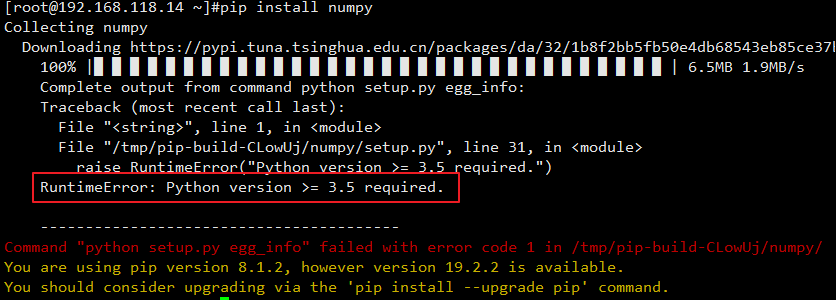
本地是 python 2.7 最新版本的 numpy 不支持,这就需要手动下载安装。
[root@192.168.118.14 ~]#wget https://pypi.tuna.tsinghua.edu.cn/packages/c4/33/8ec8dcdb4ede5d453047bbdbd01916dbaccdb63e98bba60989718f5f0876/numpy-1.16.2-cp27-cp27mu-manylinux1_x86_64.whl#sha256=fb3c83554f39f48f3fa3123b9c24aecf681b1c289f9334f8215c1d3c8e2f6e5b [root@192.168.118.14 ~]#pip install numpy-1.16.2-cp27-cp27mu-manylinux1_x86_64.whl 测试是否安装成功: [root@192.168.118.14 ~]#python Python 2.7.5 (default, Jun 20 2019, 20:27:34) [GCC 4.8.5 20150623 (Red Hat 4.8.5-36)] on linux2 Type "help", "copyright", "credits" or "license" for more information. >>> import numpy
没有报错,说明安装成功。
下载 webvirtmgr 程序包
[root@192.168.118.14 ~]#git clone git://github.com/retspen/webvirtmgr.git
安装python程序依赖的库文件
[root@192.168.118.14 ~/webvirtmgr]# pip install -r requirements.txt [root@192.168.118.14 ~/webvirtmgr]#./manage.py syncdb
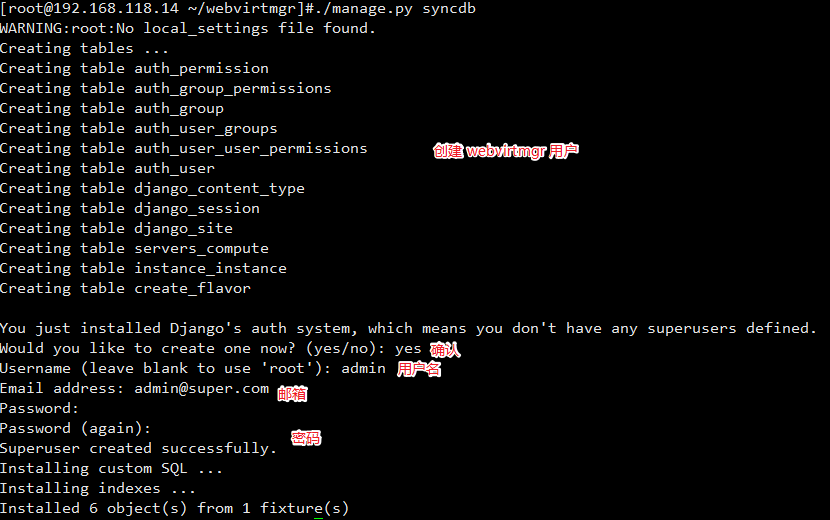
生成配置文件
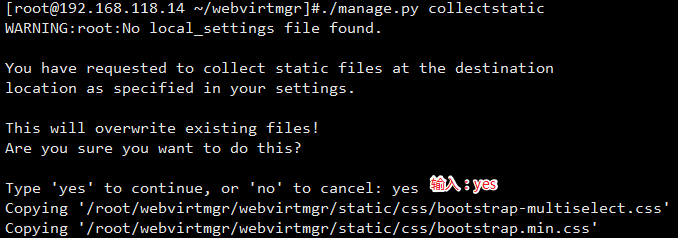
创建管理员用户

接下来,将 webvirtmgr 项目整个做成web可以访问的站点
[root@192.168.118.14 ~]#mkdir -pv /var/www [root@192.168.118.14 ~]#cp -a webvirtmgr/ /var/www/ [root@192.168.118.14 ~]#chown -R nginx:nginx /var/www/
修改nginx 主配置文件:
将默认的 server 段注释掉
[root@192.168.118.14 ~]#vim /etc/nginx/nginx.conf
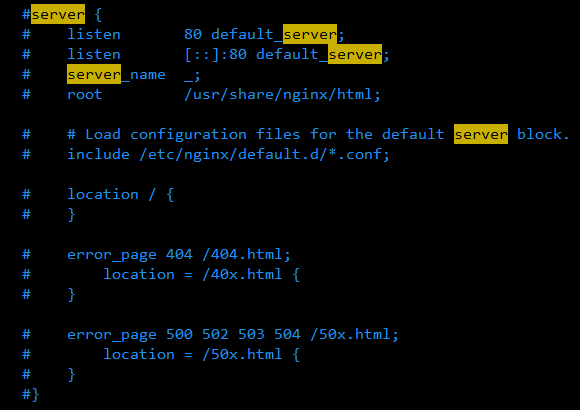
新增配置文件 webvirtmgr.conf
[root@192.168.118.14 ~]#cat /etc/nginx/conf.d/webvirtmgr.conf
server {
listen 80 default_server;
server_name $hostname;
#access_log /var/log/nginx/webvirtmgr_access_log;
location /static/ {
root /var/www/webvirtmgr/webvirtmgr; # or /srv instead of /var
expires max;
}
location / {
proxy_pass http://127.0.0.1:8000;
proxy_set_header X-Real-IP $remote_addr;
proxy_set_header X-Forwarded-for $proxy_add_x_forwarded_for;
proxy_set_header Host $host:$server_port;
proxy_set_header X-Forwarded-Proto $scheme;
proxy_connect_timeout 600;
proxy_read_timeout 600;
proxy_send_timeout 600;
client_max_body_size 1024M; # Set higher depending on your needs
}
}
检查语法:
[root@192.168.118.14 ~]#nginx -t nginx: the configuration file /etc/nginx/nginx.conf syntax is ok nginx: configuration file /etc/nginx/nginx.conf test is successful [root@192.168.118.14 ~]#nginx [root@192.168.118.14 ~]#netstat -ntplu | egrep nginx tcp 0 0 0.0.0.0:80 0.0.0.0:* LISTEN 17710/nginx: master
启动成功,通过 web 尝试访问。
修改配置 supervisor 服务
[root@192.168.118.14 ~]#vim /etc/supervisord.conf
添加如下内容:
[program:webvirtmgr]
command=/usr/bin/python /var/www/webvirtmgr/manage.py run_gunicorn -c /var/www/webvirtmgr/conf/gunicorn.conf.py
directory=/var/www/webvirtmgr
autostart=true
autorestart=true
logfile=/var/log/supervisor/webvirtmgr.log
log_stderr=true
user=nginx
[program:webvirtmgr-console]
command=/usr/bin/python /var/www/webvirtmgr/console/webvirtmgr-console
directory=/var/www/webvirtmgr
autostart=true
autorestart=true
stdout_logfile=/var/log/supervisor/webvirtmgr-console.log
redirect_stderr=true
user=nginx
启动服务
[root@192.168.118.14 ~]#systemctl start supervisord
[root@192.168.118.14 ~]#systemctl status supervisord
● supervisord.service - Process Monitoring and Control Daemon
Loaded: loaded (/usr/lib/systemd/system/supervisord.service; disabled; vendor preset: disabled)
Active: active (running) since Tue 2019-08-13 09:51:25 CST; 1s ago
Process: 17741 ExecStart=/usr/bin/supervisord -c /etc/supervisord.conf (code=exited, status=0/SUCCESS)
Main PID: 17744 (supervisord)
CGroup: /system.slice/supervisord.service
├─17744 /usr/bin/python /usr/bin/supervisord -c /etc/supervisord.conf
├─17745 /usr/bin/python /var/www/webvirtmgr/console/webvirtmgr-console
├─17746 /usr/bin/python /var/www/webvirtmgr/manage.py run_gunicorn -c /var/www/webvirtmgr/conf/gunicorn.conf.py
├─17755 /usr/bin/python /var/www/webvirtmgr/manage.py run_gunicorn -c /var/www/webvirtmgr/conf/gunicorn.conf.py
├─17756 /usr/bin/python /var/www/webvirtmgr/manage.py run_gunicorn -c /var/www/webvirtmgr/conf/gunicorn.conf.py
├─17757 /usr/bin/python /var/www/webvirtmgr/manage.py run_gunicorn -c /var/www/webvirtmgr/conf/gunicorn.conf.py
├─17758 /usr/bin/python /var/www/webvirtmgr/manage.py run_gunicorn -c /var/www/webvirtmgr/conf/gunicorn.conf.py
├─17759 /usr/bin/python /var/www/webvirtmgr/manage.py run_gunicorn -c /var/www/webvirtmgr/conf/gunicorn.conf.py
└─17760 /usr/bin/python /var/www/webvirtmgr/manage.py run_gunicorn -c /var/www/webvirtmgr/conf/gunicorn.conf.py
Aug 13 09:51:25 webvirtmgr.super.com systemd[1]: Starting Process Monitoring and Control Daemon...
Aug 13 09:51:25 webvirtmgr.super.com systemd[1]: Started Process Monitoring and Control Daemon.
浏览器尝试访问webvirtmgr 地址:http://192.168.118.14/login/

上面创建的两个用户都可以登录。

登录成功。到此,webvirtmgr控制台安装完毕。
3.2 kvm node节点配置
切换到 node1 节点(192.168.118.15)安装部署
[root@192.168.118.15 ~]#yum install libvirt qemu-kvm virt-viewer -y
这里有一步容易忽视,会造成后面虚拟机无法创建成功,需要注意下。
[root@192.168.118.15 ~]#ln -vs /usr/libexec/qemu-kvm /usr/bin/ ‘/usr/bin/qemu-kvm’ -> ‘/usr/libexec/qemu-kvm’
不需要默认nat网络模式,移除
[root@192.168.118.15 ~]#mv /etc/libvirt/qemu/networks/default.xml /tmp/
[root@192.168.118.15 ~]#systemctl start libvirtd
[root@192.168.118.15 ~]#systemctl status libvirtd
● libvirtd.service - Virtualization daemon
Loaded: loaded (/usr/lib/systemd/system/libvirtd.service; enabled; vendor preset: enabled)
Active: active (running) since Tue 2019-08-13 09:59:25 CST; 1s ago
Docs: man:libvirtd(8)
http://libvirt.org
Main PID: 20741 (libvirtd)
CGroup: /system.slice/libvirtd.service
└─20741 /usr/sbin/libvirtd
Aug 13 09:59:25 node1.super.com systemd[1]: Starting Virtualization daemon...
Aug 13 09:59:25 node1.super.com systemd[1]: Started Virtualization daemon.
3.3 控制台和kvm节点交互配置
到此,kvm 主机算配置完成,接下来需要配置控制台到kvm主机交互的环节
webvirtmgr 主机
切换到 nginx 用户,生成密钥对,然后将公钥拷贝到 kvm主机节点,实现免密码登录,因为命令是通过nginx用户发送到kvm主机执行的。
[root@192.168.118.14 ~]#su - nginx -s /bin/bash -bash-4.2$ ssh-keygen -t rsa -P '' Generating public/private rsa key pair. Enter file in which to save the key (/var/lib/nginx/.ssh/id_rsa): Created directory '/var/lib/nginx/.ssh'. Your identification has been saved in /var/lib/nginx/.ssh/id_rsa. Your public key has been saved in /var/lib/nginx/.ssh/id_rsa.pub. The key fingerprint is: b4:0d:f6:0e:2d:5e:94:2b:56:97:b4:e0:7b:e3:26:f9 nginx@webvirtmgr.super.com The key's randomart image is: +--[ RSA 2048]----+ | . . | | . + o | | + = + | | o O + | | S B o | | o * + . | | . + o | | + | | E | +-----------------+
# 将密钥拷贝到 KVM主机
ssh-copy-id root@192.168.118.15
注意:如果这里是非22端口则采用如下命令:
ssh-copy-id '-p [ssh端口] root@192.168.118.15'
可以在 webvirtmgr 安装 libvirt-client 进行测试:
[root@192.168.118.14 ~]#yum install libvirt-client -y -bash-4.2$ virsh --connect qemu+ssh://root@192.168.118.15/system list --all Id Name State ----------------------------------------------------
访问成功,接下来就可以在 web 页面进行操作了。
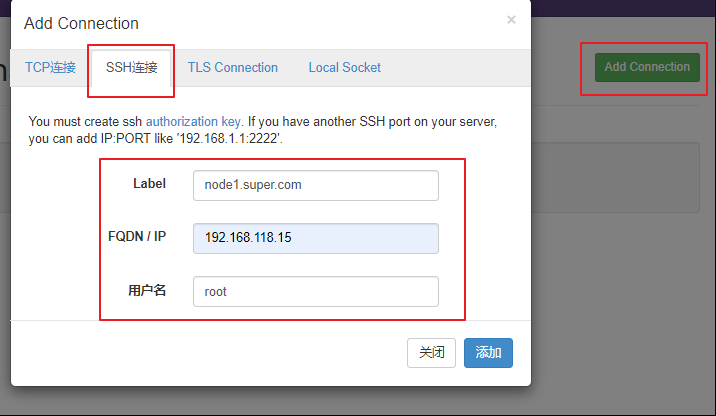
这里是直接使用 root用户,建议使用普通用户,但是要注意权限,点击添加
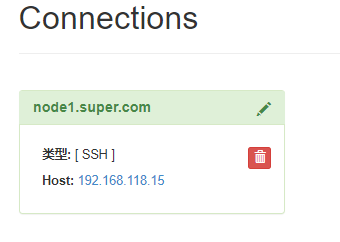

点进来如果没有任何报错,那么基本上已经添加主机成功了。
1. 创建网桥
在创建网桥这一步要非常小心,因为稍微不注意网卡起不来就有可能直接无法连接服务器。
关闭 NetworkManager 服务
[root@192.168.118.15 ~]#systemctl stop NetworkManager; systemctl disable NetworkManager

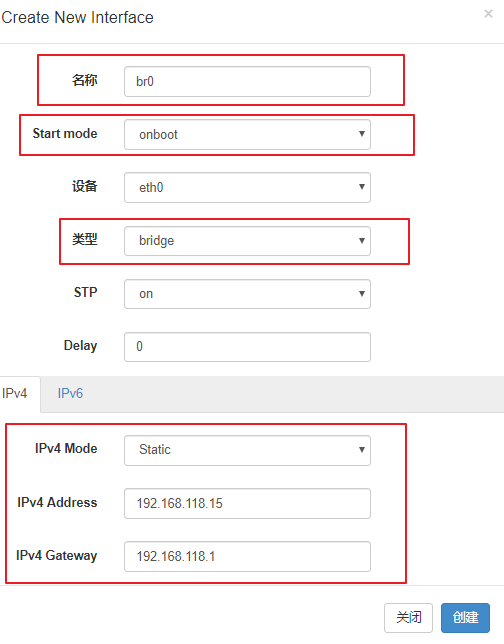
点击创建。
这里发现使用 web 页面创建网桥没有成功。
[root@192.168.118.15 ~]#brctl show bridge name bridge id STP enabled interfaces
如果没有创建成功,则直接通过命令行创建:
[root@192.168.118.15 ~]#virsh iface-bridge eth0 br0 Created bridge br0 with attached device eth0 Bridge interface br0 started [root@192.168.118.15 ~]#brctl show bridge name bridge id STP enabled interfaces br0 8000.5254006205ad yes eth0
创建成功,切换到web页面刷新

创建的 br0 网桥已经出现。
2. 创建网络池
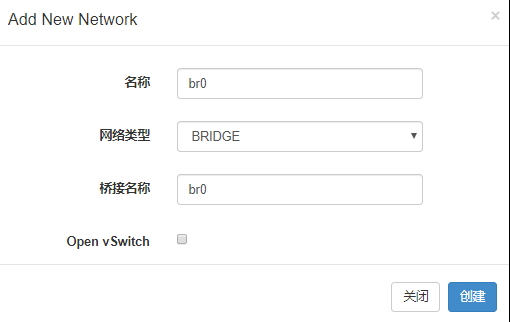

3. 创建存储池
一般可以创建两个存储池:
(1) 用来存放虚拟磁盘文件(本地)
(2) 用来存放 iso 文件 (nfs)
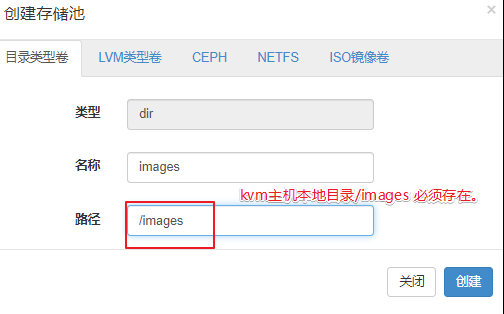
创建 iso 存储池需要在 webvirtmgr 节点安装 nfs 配置
[root@192.168.118.14 ~]#yum install nfs-utils -y [root@192.168.118.14 ~]#cat /etc/exports /iso *(rw,sync) [root@192.168.118.14 ~]#systemctl start rpcbind [root@192.168.118.14 ~]#systemctl start nfs
在 kvm 主机上测试
[root@192.168.118.15 ~]#showmount -e 192.168.118.14 Export list for 192.168.118.14: /iso * [root@192.168.118.15 ~]#mkdir -pv /iso mkdir: created directory ‘/iso’
ok,nfs是可以访问到的。切换到 web 界面进行配置
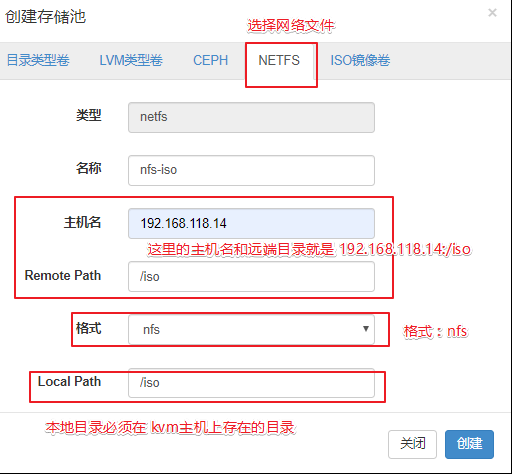
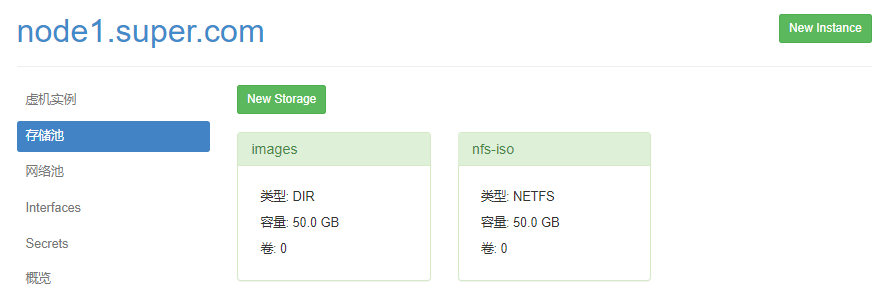
两个存储池创建成功,接下来就可以尝试创建虚拟机了。
4. 创建虚拟机
(1)创建虚拟磁盘文件
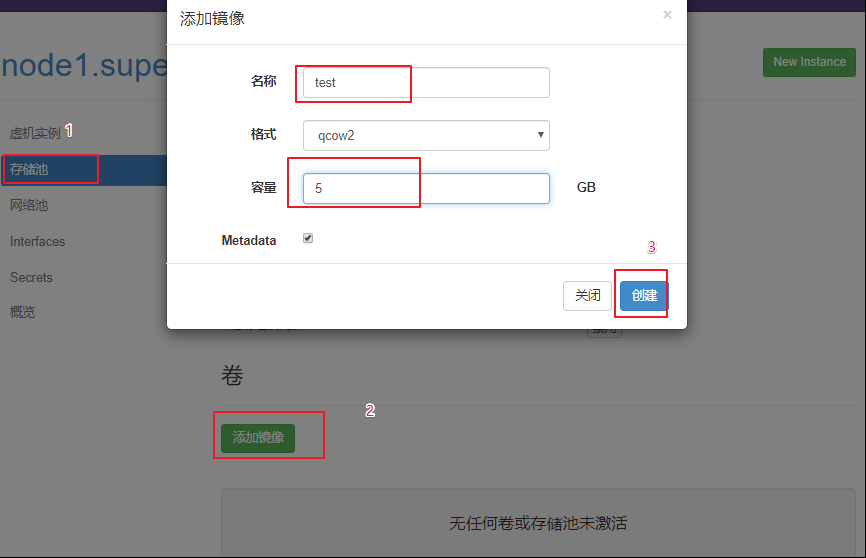
(2)创建虚拟机
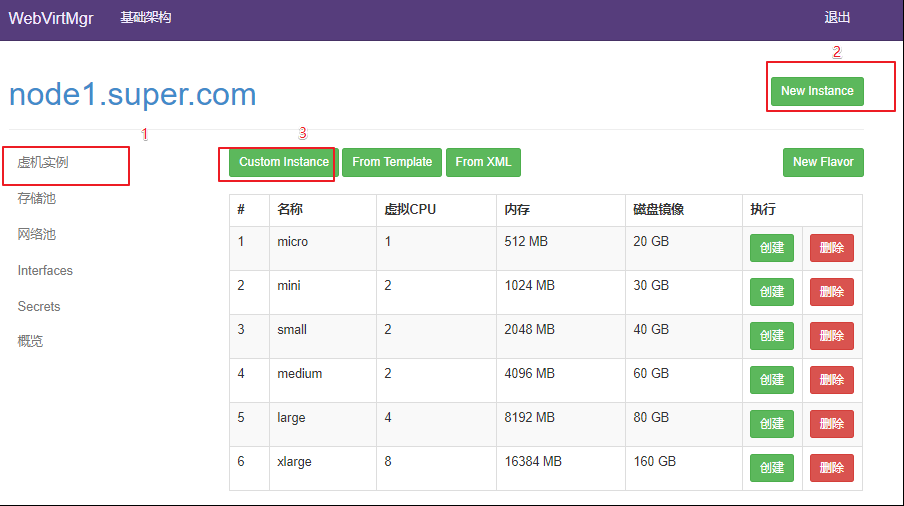

创建完成后,启动虚拟机
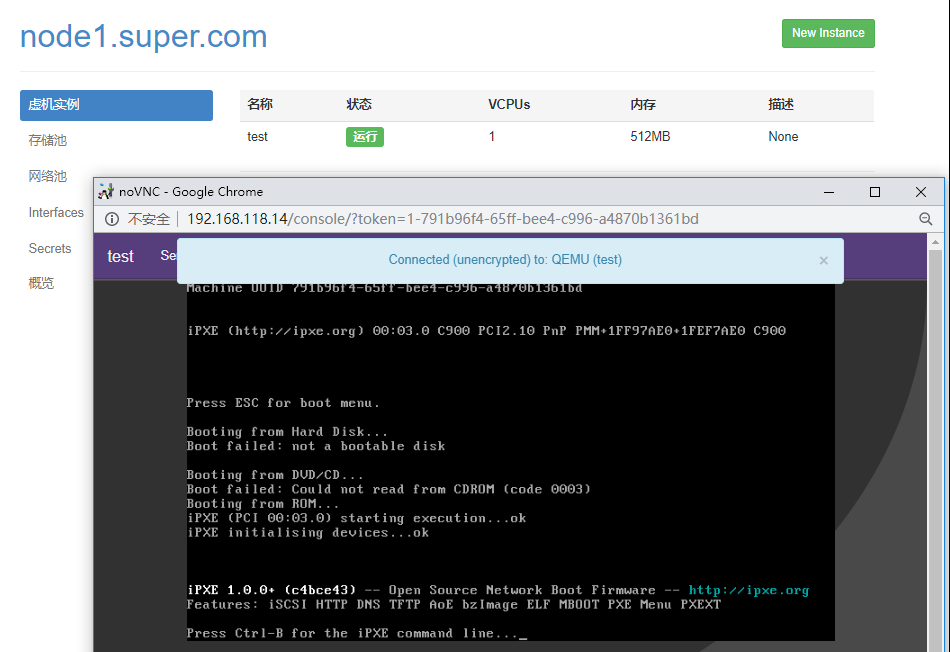
可以直接通过控制台查看虚拟机。虚拟机创建完成。
现在拷贝 Centos 7 镜像到 存储池的 iso 目录下。
[root@192.168.118.14 ~]#scp 192.168.118.8:/usr/local/src/CentOS-7-x86_64-Minimal-1511.iso /iso/
切换到web页面查看存储池。
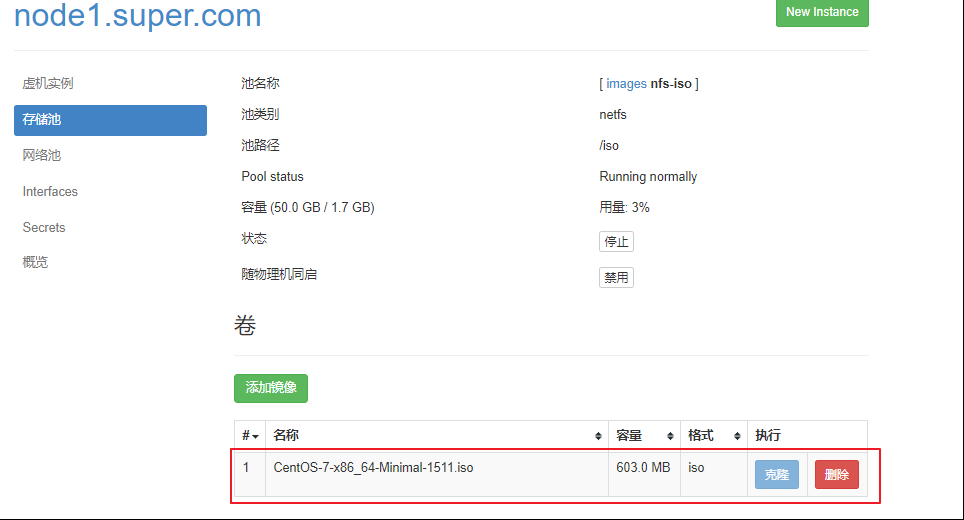
关闭当前虚拟机,为虚拟机添加 iso CDROM
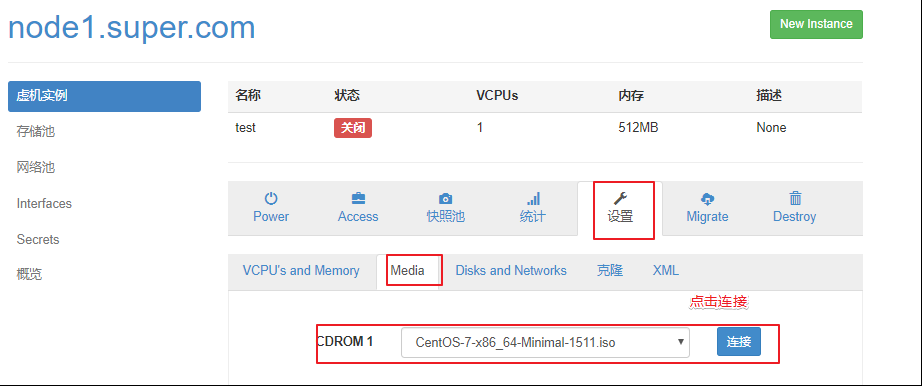
再次开启虚拟机,就可以为虚拟机安装操作系统了。
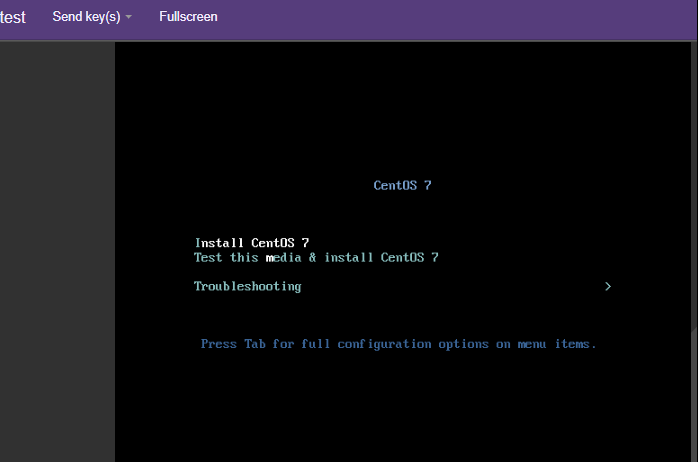
完毕。